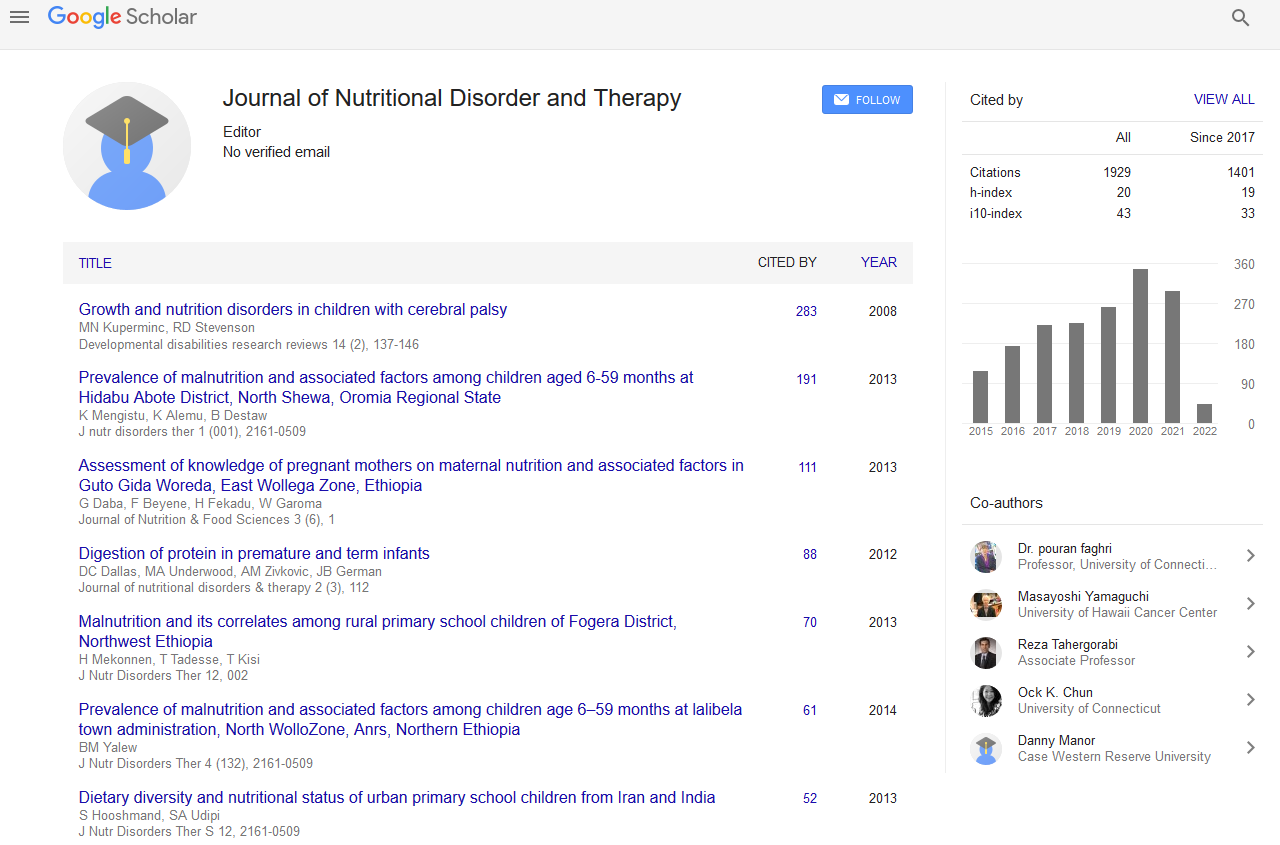Indexed In
- Open J Gate
- Genamics JournalSeek
- Academic Keys
- JournalTOCs
- Ulrich's Periodicals Directory
- RefSeek
- Hamdard University
- EBSCO A-Z
- OCLC- WorldCat
- Publons
- Geneva Foundation for Medical Education and Research
- Euro Pub
Useful Links
Share This Page
Journal Flyer

Open Access Journals
- Agri and Aquaculture
- Biochemistry
- Bioinformatics & Systems Biology
- Business & Management
- Chemistry
- Clinical Sciences
- Engineering
- Food & Nutrition
- General Science
- Genetics & Molecular Biology
- Immunology & Microbiology
- Medical Sciences
- Neuroscience & Psychology
- Nursing & Health Care
- Pharmaceutical Sciences
Protective effect of perilla oil and alpha-linolenic acid on neuronal apoptosis induced by oxidative stress
JOINT EVENT: 13th International Congress on Advances in Natural Medicines Nutraceuticals & Neurocognition & 14th International Conference on Clinical Nutrition
July 27-29, 2017 Rome, Italy
Ah Young Lee, Hyun Young Kim, Sanghyun Lee, Myoung Hee Lee and Eun Ju Cho
Pusan National University, Republic of Korea
Gyeongnam National University of Science and Technology, Republic of Korea
Chung-Ang University, Republic of Korea
National institute of Crop Science - Rural Development Administration, Republic of Korea
Posters & Accepted Abstracts: J Nutr Disorders Ther
Abstract:
Oxidative stress plays a key role in neuronal cell damage, which is associated with neurodegenerative disease. Recently, attention has been paid to searching for natural source that can protect neuronal cell damage against oxidative stress. Although there are evidences that dietary n-3 fatty acid has beneficial effects, it has been focused on fish oil. Alphalinolenic acid (ALA) is also promising n-3 fatty acids in vegetable oils with health beneficial roles. Perilla oil (PO) contains the largest proportion of ALA. However, the study on molecular mechanism between ALA and hydrogen peroxide (H2O2)- induced neuronal apoptosis has not been studied yet. The aim of present study is to investigate the neuro-protective effects of PO and ALA against H2O2-induced oxidative stress in SH-SY5Y neuronal cells. Our result showed that treatment with PO and ALA significantly attenuated H2O2-induced cell death, indicating that PO and ALA potently blocks H2O2- induced neuronal apoptosis. Furthermore, cleaved-poly ADP ribose polymerase, cleaved caspase-3 and -9 activations were decreased in the presence of PO and ALA and H2O2-mediated down-regulated Bax/Bcl-2 ratio was blocked after treatment with PO and ALA. Taken together, the protective role of PO from neuronal cell damage is mainly attributed to ALA. The present study suggests that PO and ALA may play potent therapeutic agents for neurodegenerative disorders such as Alzheimer�??s disease.
Biography :
Ah Young Lee is a PhD candidate in Food Science and Nutrition at Pusan National University of Korea, and conducts study under the guidance of Professor Eun Ju Cho. Her research activities include Bioavailability of Natural Sources in vitro and in vivo system. She has authored or co-authored 18 manuscripts, and is a fellow funded by Global PhD Fellowship from National Research Foundation. Her laboratory mainly conducts research on development of nutraceuticals with cognitive improvement using natural sources, and currently interests in mechanisms of amyloid beta metabolism that helps explain neurodegenerative disease such as Alzheimer’s disease.


